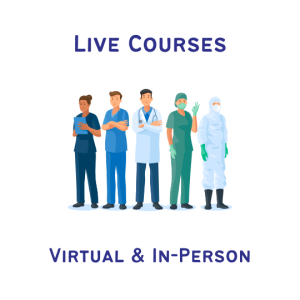
Published April 11, 2023 | Updated August 23, 2023
By Dawn Barlow
Dawn is a doctor who recognises that being a doctor is not the be-all and end-all to life.Working as a locum enables her to fulfil her passions of performing, writing, making videos, podcasting, travelling and, most importantly… having fun!
We all need a bit of variety in life. There’s no better feeling than replacing that pitter-pattering of junior doctor’s sketchers along the hospital corridor once in a while. Some might want to replace that with silence to recover from the hubbub of activity on the wards.
However, others of the more active and adventurous mindset, like myself, may prefer to replace it with the sound of that low muffled murmur of a community of like-minded individuals waking up together in tents, at the crack of dawn.
But many of us, also like myself initially, have no idea how to break into such a field. I hear you ask: “Do you need qualifications to become an expedition medic? How do I go about finding expedition work? How do I book onto my first expedition as a doctor?! HEEEELPPP!”
Firstly, please calm down.
Secondly, I’m going answer all of those questions to tell you how you can replace the smell of rotting diabetic foot flesh, with crisp fresh mountain air or warm, humid breeze wafting over your sunbathed skin. If that isn’t enticing, I don’t know what is!
The sections in highlighted boxes are extremely important to read.
DO NOT NEGLECT!
What Qualifications Do I Need to Become an Expedition Medic?
Let’s start off with the first question. Now, obviously, you need a medical degree, and therefore cannot be the medic on expeditions as a medical student.
You also need to have a full GMC registration to be working as a doctor outside of your trust (although technically you’re not “working.” You’re “volunteering” but more on that later). Therefore you will need to be FY2 or above.
Can I be an Expedition Medic as an FY2?
I would advise doing expedition work as an F2 with caution. It is very dependent on your confidence level, experience level and current jobs. I certainly would not have felt comfortable leading an expedition as an F2 doctor, but that obviously doesn’t apply to everyone.
But this article isn’t useless if you are an F2, because it’s always good to get your foot in the door now so that when the expeditions are released (sometimes up to a year in advance), you’re able to sign yourself up when the time comes.
Let’s compare these two F2s:

- Avid outdoors person
- Regularly visits the moors for bouldering.
- Has done lots of volunteering with St John’s Ambulance and/or has done a FREC and has been a first responder at festivals.
- Confident in working independently and in making decisions without a senior present.
- Able to suture, or manage basic wounds
- Has done ALS (or ATLS as a bonus)
- Very comfortable with BLS.
- Happy to administer drugs, especially those which you’ve never prescribed before.

- Enjoys the outdoors when the weather is nice.
- Just focusing on getting through F1 and F2 which is taking up a lot of time.
- Has very busy jobs, which are mainly focused on service provision and ward jobs.
- Hasn’t done ED yet.
- Has done BLS and has ALS coming up soon.
- Would be unsure about administering drugs that they’ve never given before, and would want to ask a senior and run things by them.
Now clearly, one person is not going to fit completely into person 1, but I think the strong takeaways here are these lines:
If you’re unsure about those, it doesn’t mean you’re not cut out for it. It just means you need to get some more experience under your belt and then get cracking!
Personally, as an F2, I fit more into the profile of person 2. I didn’t reach person 1 level until F3/F4 and that’s ok. Some people just need more time and experience to gain confidence.
Should I Do an Expedition Medicine Course?
Expedition medicine courses and degrees are available and can often be funded via your study budget (if it fits in with your personal development plan). So do you need to have one of those under your belt before applying?
Whilst it’s preferable to have some experience on a course, they can also be expensive and are not mandatory. I’ve attended two courses which have been in the UK—one was free and another was £700 for a week. There are also courses abroad which cost thousands. If you can afford these, they may be worth doing, but I’ve never done one so cannot vouch for them!
Get some free or cheap expedition medicine courses under your belt, and sign up for the yearly wilderness medicine conferences or other online conferences related to expedition medicine.
How Much Time Out Do I Need?
Another factor to consider is whether you have the time to take out for expeditions. Usually, they will be one to two weeks in length and that isn’t factoring in recovery time (more important than you realise), travel to and from the airport, packing and preparation time.
It is therefore much MUCH easier to do expedition work as a locum, or in jobs which have an on/off rota, but that doesn’t stop training doctors from doing it. You just need to be willing to give up your annual leave to do them. Or if you’re an 80/20 emergency department doctor you may be able to use some of that 20% time for expedition work.
Some other specialities will not be as forgiving, however… medicine, we’re talking to you!
I’ve got some good news though! These trips are often booked months in advance, usually around 6-9 months! This means that you’ll be able to alert any rota coordinators well in advance of the time you require off. That is, of course, if they give you the rota in time!
There’s something important to note here – saying you’ll do a trip and then cancelling last minute is really not cool. It will likely damage your reputation with the company and put you down the list for having the top pick in future. So, unless there are extremely extenuating circumstances (e.g. funeral, significant injury etc), I wouldn’t make the commitment if it’s not something you’re sure you can commit to!
Will I Get Paid to Be an Expedition Doctor?
Now, wouldn’t this be the pot of gold at the end of the rainbow; getting paid to frolic about in the outdoors, in far-flung lands with cool adventurous and charitable people?
Well, unfortunately, much like the mythical pot of gold at the end of that rainbow, payment for expedition work as a doctor sadly doesn’t exist.
Why?
Because it’s highly sought after and everyone wants to do it. It’s a supply and demand dynamic. It’s not a side hustle for most, but a passion. Unlike working on a medical outlier ward, there are plenty of people who will do it for free as you get the benefit of travelling essentially for free!
Will Working as an Expedition Medic Cost Me Money?
Let’s really crunch the numbers here, because my first expedition as a doctor was climbing Mount Kilimanjaro in Tanzania and actually ended up costing me money. Whilst it’s not the most technical climb, climbing at altitude is HARD WORK and you will therefore need to prepare for this trip.
This might involve buying new equipment for the climb, and whilst a lot of your expenses may be reimbursed, purchasing personal equipment is not one of those reimbursements.
Unless you are willing to traipse around, gathering supplies from various people who may have some good quality climbing poles lying around, you will likely have to buy them yourself.
As a bonus, you may already have this stuff from previous outdoor adventures you have done, but these trips are no joke. They are called “challenges” for a reason, so if you have any doubt that the equipment you already have could disintegrate into pieces at 3000m altitude, I suggest you get yourself to GO Outdoors (other outdoor shops are available)!
Fortunately, I do love shopping, and I also had some equipment that I could reuse from my time travelling. I still ended up spending around £1,000 on new boots, poles, clothes etc. Working as a locum meant this was quite easily possible for me, but that may not be the case for others.
I would also quickly like to point out that it’s not necessary to spend that much money. I signed up for two very last-minute trips back to back (which I thoroughly and significantly do not recommend). I only had 2 weeks to prepare, so didn’t really have the time to be going around asking people to borrow things.
Furthermore, I had two very polar opposite trips, one in the freezing cold altitude of Mount Kilimanjaro, and the second in the boiling hot Moroccan Sahara desert. This meant that I had to essentially buy two sets of equipment. It was not a great time for my bank balance!
What Expenses are Covered?
Whilst you might not get paid to be an expedition medic, the bonus is that you get almost all of your expenses paid for. That includes flights, travel to and from the airport, all food and travel whilst on the trip, medical indemnity (depending on the company) and medical equipment.
This means that once you’ve done one trip and purchased all of the equipment, you’re essentially set to go and do other expeditions at little to no cost.
You will likely have to purchase your own personal travel insurance, and please don’t go without this. You’re going to be doing hard and potentially dangerous challenges. You don’t want the fun, no-expenses trip, to turn into an expensive healthcare nightmare!
In the rare case of an indemnity case made against you, also check who will cover the claim excess (as this can often be >£1000).
N.B. Please make sure that you check clearly with each of the companies about all of the expenses covered before you agree to go, unless you’re happy to put in some of your own money. It’s always good to set expectations before a trip, rather than during or after.
Questions to Ask the Organiser
Feel free to copy and paste this into an email, to make sure you have it documented in cases of later confusion).
Thank you for the opportunity to join [insert trip name] trip as your medic! As this is our first time working together, I just wanted to clarify a few things beforehand regarding expenses and equipment:
- Which expenses are covered by the company?
If they don’t reply very specifically, it may be worth asking about all of these:
- Do you have a full kit list of personal equipment that I need to take for the trip?
I would also ask here if they have any trip documents, detailing the outline of the trip, length of the trip, types of climates and terrain etc. These documents are very useful so that you know what you’re getting yourself into!
- Do you have a kit list of medical equipment and drugs that are provided?
I would be wary of any company which does not provide a medical equipment bag (also called a med bag).
Personally, I would not work with a company that did not provide this. It’s very difficult and expensive to get hold of medical supplies and you are then responsible for the documentation, which may be complicated across borders.
How Do I Sign Up for Expeditions as a Doctor?
I’m sorry we had to get all of that super-important information out of the way first! Now we have done that, let’s get to the meaty section, the fun bit! How to ACTUALLY sign up for expeditions!
As I’ve eluded to many times earlier in the article, the easiest and safest way to join trips as an expedition medic is to get in contact with a company. There are so many companies out there such as Raleigh.
However, some companies will want you to fundraise to join the trip. Personally, this is not something I could commit to, with so many other things going on in my life. Yes, I get it, it’s a lovely and noble thing to do… But I don’t know many doctors who could put aside 6 months of their lives in order to fundraise! Of course, if you’re one of those people who loves fundraising or has time to do it, don’t let me put you off.
Two Ways to Look For Expedition Medic Jobs
1 – Look on a Jobs Board and Sign Up From There
Looking on job boards is a great way to know which companies are out there and offering trips. You will also get a better idea of what sort of expeditions are available for medics, to find the right fit.
Some examples of jobs boards are below:
These are very high-traffic sites, so you will face some competition in applying for jobs. You may find it easier to find expedition roles as a doctor by being in the know with the companies who actually run these challenges.
2- Book Directly with the Company
There are two ways to find these smaller companies offering expeditions – look via job boards, or search individual trips using a search engine. For example, using the search term “Kilimanjaro challenges” you will find your way to the customer section of expedition websites. You can then find a “vacancies” or “contact us” page and send them an email to enquire about any upcoming trips.
Trips don’t usually pop up every week – they are often booked WELL in advance, sometimes years!
Don’t be disheartened if you don’t get a trip straight away. Patience is key here! Get your name known and your email onto their mailing list. Whenever they have new trips come up, especially at late notice (if someone drops out), their first port of call will be their mailing list of regular doctors!
Often these jobs don’t even make it out onto those job boards. You will want to get onto a few challenge company mailing lists. Build a relationship with them over time.
Don’t expect to be offered the best challenges straight away; you might have to prove yourself first: not only your competence but also your trustworthiness. As a result, you may need to accept jobs which aren’t necessarily preferable. For example, you might want to go to Cambodia on a cycling trip, but they only have availability for a Ben Nevis overnight walking challenge. Consider accepting these less desirable trips and get to know everyone in the company.
How to Find Good Expedition Companies
Reputation is everything in this business – if you hear good, or bad, things about a company, don’t dismiss it.
When searching for jobs, look at the reviews and listen to other doctors who have worked for that company. What do they think?
You should also read reviews or testimonials from clients of theirs; Was the trip well organised, were the staff friendly, do they get repeat custom, and most importantly was the food good?!
A company that I personally work with is Discover Adventure which has a great reputation. All of the staff I have interacted with are very friendly and only have good things to say about the company. Furthermore, their clients are repeat customers of the business, which speaks volumes!
Other companies you could try:
- Kilimanjaro Challenge
- Action Challenge
- Global Adventure Challenges
- Choose a Challenge
- Charity Challenge
- Life Changing Challenges
The list goes on! Please be aware, I have not worked for any of these, so please do some research beforehand!
If Kilimanjaro is not your vibe, you could also try terms like:
- “Charity challenges”
- “Adventure company”
- “Expedition challenges”
- “Trekking challenges”
- “Cycling challenges”
Or something along those lines! That should give you somewhere to start.
Next, find their contact details and get contacting!
Send out enquiry emails to all of the companies – you can use a template for this. Here is a template I have written for you:
Expedition Organiser Enquiry Template
Dear [company or contact name],
I’m [insert your name], a [grade/speciality] doctor ([year] graduated), looking for potential expedition trips as a doctor.
My experience includes:
[insert experience]
Important to include:
- Acute medicine or, even more importantly, emergency medicine experience (even if it’s as a locum or in F1 or F2)
- Working in remote locations (maybe mention your elective)
- Festival or pre-hospital medicine events
- Any courses to extra qualifications you may have (e.g. wilderness or remote medicine courses or events)
- Do you have ALS or ATLS training?
- Do you have altitude experience?
- Have you climbed any mountains or done lots of travelling?
- Which sports are you good at or into? E.g. skiing/climbing/cycling/hiking
I am emailing to enquire about whether you need any doctors for any trips, or whether I could be added to the mailing list for future trips.
I look forward to hearing from you!
Thanks, [insert name again]
Note that I used the words “expedition trips” rather than “work.” You won’t be getting paid for these roles, and you will be termed a “volunteer medic.” Therefore it might be helpful for them to understand that you’re not looking for employment.
And now you wait…
Expect for some rejections or non-repliers. Some companies may only take emergency medicine specialist doctors, doctor with previous wilderness medicine experience or with a wilderness/expedition medicine qualification. That’s ok, because there will be some other companies who are not looking for this. And those are who you go with!

Extremely Important Personal Jobs Which Should NOT be Neglected
If you take anything away from this, please pay attention to this!












